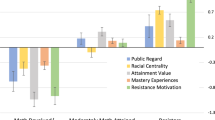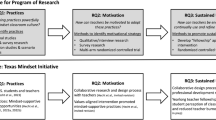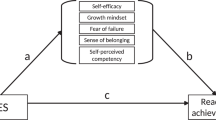Abstract
As racial inequities continue to pervade school systems around the world, further research is necessary to understand the factors undergirding this pressing issue. Here across three studies conducted in the United States (N = 8,293), we provide evidence that race-based differences in student achievement do not stem from a lack of motivation among Black, Latinx and Indigenous (BLI) students, but a lack of equitable motivational payoff. Even when BLI and non-BLI students have the same levels of motivation, BLI students still receive maths grades that are an average of 9% lower than those of their non-BLI peers (95% confidence interval 7 to 11%). This pattern was not explained by differences in students’ aptitude, effort or prior achievement but was instead linked to teachers’ diminished expectations for their BLI students’ academic futures. We conclude by discussing statistical power limitations and the implications of the current findings for how researchers consider the sources of, and solutions for, educational inequity.
This is a preview of subscription content, access via your institution
Access options
Access Nature and 54 other Nature Portfolio journals
Get Nature+, our best-value online-access subscription
$29.99 / 30 days
cancel any time
Subscribe to this journal
Receive 12 digital issues and online access to articles
$119.00 per year
only $9.92 per issue
Buy this article
- Purchase on Springer Link
- Instant access to full article PDF
Prices may be subject to local taxes which are calculated during checkout



Similar content being viewed by others
Data availability
Per the ethics board agreement, the complete datasets for studies 1 and 2 will be made available upon request pending approval from the University System of Georgia. The datasets provided will be limited to the variables relevant to the current analyses. The complete dataset for study 3 is publicly available on the National Center for Education Statistics website: https://nces.ed.gov/surveys/els2002/avail_data.asp.
Code availability
The complete analytic code for each study may be found here: https://osf.io/bfv2x/files/osfstorage.
References
Elliot, A. J., Dweck, C. S. & Yeager, D. S. (eds) Handbook of Competence and Motivation: Theory and Application (Guilford Publications, 2017).
Guo, J., Parker, P. D., Marsh, H. W. & Morin, A. J. Achievement, motivation, and educational choices: a longitudinal study of expectancy and value using a multiplicative perspective. Dev. Psychol. 51, 1163–1176 (2015).
Hong, W., Bernacki, M. L. & Perera, H. N. A latent profile analysis of undergraduates’ achievement motivations and metacognitive behaviors, and their relations to achievement in science. J. Educ. Psychol. 112, 1409–1430 (2020).
Jiang, S., Simpkins, S. D. & Eccles, J. S. Individuals’ math and science motivation and their subsequent STEM choices and achievement in high school and college: a longitudinal study of gender and college generation status differences. Dev. Psychol. 56, 2137–2151 (2020).
DeVoe, J. F. & Darling-Churchill, K. E. Status and Trends in the Education of American Indians and Alaska Natives: 2008. NCES 2008-084 (National Center for Education Statistics, 2008).
Hardin, T. L. A Comparative Study of Native American Student Academic Achievement in Public and Bureau of Indian Education Schools. Doctoral dissertation, Ball State Univ. (2012).
Hemphill, F. C. & Vanneman, A. Achievement Gaps: How Hispanic and White Students in Public Schools Perform in Mathematics and Reading on the National Assessment of Educational Progress. Statistical Analysis Report. NCES 2011-459 (National Center for Education Statistics, 2011).
Reardon, S. F., Kalogrides, D. & Shores, K. The geography of racial/ethnic test score gaps. Am. J. Sociol. 124, 1164–1221 (2019).
Walton, G. M., Spencer, S. J. & Erman, S. Affirmative meritocracy. Soc. Issues Policy Rev. 7, 1–35 (2013).
Broda, M. et al. Reducing inequality in academic success for incoming college students: a randomized trial of growth mindset and belonging interventions. J. Res. Educ. Eff. 11, 317–338 (2018).
Harackiewicz, J. M., Canning, E. A., Tibbetts, Y., Priniski, S. J. & Hyde, J. S. Closing achievement gaps with a utility-value intervention: disentangling race and social class. J. Personal. Soc. Psychol. 111, 745–765 (2016).
Roksa, J. & Whitley, S. E. Fostering academic success of first-year students: exploring the roles of motivation, race, and faculty. J. Coll. Stud. Dev. 58, 333–348 (2017).
Shernoff, D. J. & Schmidt, J. A. Further evidence of an engagement–achievement paradox among US high school students. J. Youth Adolesc. 37, 564–580 (2008).
Chen, X. & Weko, T. Students Who Study Science, Technology, Engineering, and Mathematics (STEM) in Postsecondary Education (US Department of Education, National Center for Education Statistics, 2009).
Griffith, A. L. Persistence of women and minorities in STEM field majors: is it the school that matters? Econ. Educ. Rev. 29, 911–922 (2010).
Oyserman, D., Johnson, E. & James, L. Seeing the destination but not the path: effects of socioeconomic disadvantage on school-focused possible self content and linked behavioral strategies. Self Identity 10, 474–492 (2011).
Priest, N. et al. Stereotyping across intersections of race and age: racial stereotyping among white adults working with children. PLoS ONE 13, e0201696 (2018).
Destin, M., Hanselman, P., Buontempo, J., Tipton, E. & Yeager, D. S. Do student mindsets differ by socioeconomic status and explain disparities in academic achievement in the United States? AERA Open 5, 1–12 (2019).
Eccles, J. et al. in Achievement and Achievement Motives (ed. Spence, J. T.) pp. 73–146 (W. H. Freeman, 1983).
Dweck, C. S. Self-Theories: Their Role in Motivation, Personality and Development (Taylor and Francis/Psychology Press, 1999).
Oyserman, D. & Lewis Jr, N. A. Seeing the destination AND the path: using identity‐based motivation to understand and reduce racial disparities in academic achievement. Soc. Issues Policy Rev. 11, 159–194 (2017).
Lavrijsen, J., Vansteenkiste, M., Boncquet, M. & Verschueren, K. Does motivation predict changes in academic achievement beyond intelligence and personality? A multitheoretical perspective. J. Educ. Psychol. 114, 772–790 (2021).
Harvey, K. E., Suizzo, M. A. & Jackson, K. M. Predicting the grades of low-income–ethnic-minority students from teacher-student discrepancies in reported motivation. J. Exp. Educ. 84, 510–528 (2016).
Mickelson, R. A. The attitude-achievement paradox among Black adolescents. Sociol. Educ. 63, 44–61 (1990).
Mickelson, R. A. in Minority Status, Oppositional Culture, & Schooling (ed. Ogbu, J. U.) pp. 348–373 (Routledge, 2008).
Downey, D. B., Ainsworth, J. W. & Qian, Z. Rethinking the attitude-achievement paradox among blacks. Sociol. Educ. 82, 1–19 (2009).
Ladson-Billings, G. & Tate, W. F. in Critical Race Theory in Education (eds Dixson, A. D., Rousseau Anderson, C. K. & Donnor, J. K.) pp. 10–31 (Routledge, 2016).
Vaught, S. E. & Castagno, A. E. “I don’t think I’m a racist”: critical race theory, teacher attitudes, and structural racism. Race Ethn. Educ. 11, 95–113 (2008).
Mello, Z. R., Mallett, R. K., Andretta, J. R. & Worrell, F. C. Stereotype threat and school belonging in adolescents from diverse racial/ethnic backgrounds. J. Risk Issues 17, 9–14 (2012).
Steele, C. M. & Aronson, J. in The Black–White Test Score Gap (eds Jencks, C. & Phillips, M.) pp. 401–427 (Brookings Institution Press, 1998).
Walton, G. M. & Cohen, G. L. A question of belonging: race, social fit, and achievement. J. Personal. Soc. Psychol. 92, 82–96 (2007).
Smalls, C., White, R., Chavous, T. & Sellers, R. Racial ideological beliefs and racial discrimination experiences as predictors of academic engagement among African American adolescents. J. Black Psychol. 33, 299–330 (2007).
McGee, E. & Spencer, M. B. Black parents as advocates, motivators, and teachers of mathematics. J. Negro Educ. 84, 473–490 (2015).
Baker, B. & Cotto, R. Jr The under-funding of Latinx-serving school districts. Phi Delta Kappan 101, 40–46 (2020).
Simeone, T. The Harvard Project on American Indian economic development: findings and considerations. Ottawa: Parliamentary Information and Research Service. Library of Parliament http://www.parl.gc.ca/Content/LOP/researchpublications/prb0737-e.htm (2007).
Boser, U., Wilhelm, M. & Hanna, R. The Power of the Pygmalion Effect: Teachers’ Expectations Strongly Predict College Completion (Center for American Progress, 2014).
Riley, T. & Ungerleider, C. Self-fulfilling prophecy: how teachers’ attributions, expectations, and stereotypes influence the learning opportunities afforded Aboriginal students. Can. J. Educ. 35, 303–333 (2012).
Sorhagen, N. S. Early teacher expectations disproportionately affect poor children’s high school performance. J. Educ. Psychol. 105, 465–477 (2013).
Woolley, M. E., Strutchens, M., Gilbert, M. C. & Martin, W. G. Mathematics success of Black middle school students: direct and indirect effects of teacher expectations and reform practices. Negro Educ. Rev. 61, 41–59 (2010).
Pit-ten Cate, I. M. & Glock, S. Teachers’ implicit attitudes toward students from different social groups: a meta-analysis. Front. Psychol. 10, 1–18 (2019).
Quinn, D. M. Racial attitudes of preK–12 and postsecondary educators: descriptive evidence from nationally representative data. Educ. Res. 6, 397–411 (2017).
Rosenthal, R. & Jacobson, L. Pygmalion in the classroom. Urban Rev. 3, 16–20 (1968).
Jussim, L. & Harber, K. D. Teacher expectations and self-fulfilling prophecies: knowns and unknowns, resolved and unresolved controversies. Personal. Soc. Psychol. Rev. 9, 131–155 (2005).
Turetsky, K. M., Sinclair, S., Starck, J. G. & Shelton, J. N. Beyond students: how teacher psychology shapes educational inequality. Trends Cogn. Sci. 25, 697–709 (2021).
Gershenson, S. & Papageorge, N. The power of teacher expectations: how racial bias hinders student attainment. Education 18, 64–71 (2018).
Cronin, M. R. et al. Anti-racist interventions to transform ecology, evolution and conservation biology departments. Nat. Ecol. Evol. 5, 1213–1223 (2021).
Destin, M. Identity research that engages contextual forces to reduce socioeconomic disparities in education. Curr. Dir. Psychol. Sci. 29, 161–166 (2020).
Destin, M., Silverman, D. M. & Rogers, L. O. Expanding the social psychological study of educators through humanizing principles. Soc. Personal. Psychol. Compass 16, e12668 (2022).
Silverman, D. M., Hernandez, I. A., & Destin M. Educators’ beliefs about students’ socioeconomic backgrounds as an avenue for supporting motivation. Personal. Soc. Psychol. Bull. 49, 215–232 (2023).
National Science Board. Science & Engineering Indicators, 2018 (National Science Board, 2018).
Ma, J., Pender, M. & Welch, M. Education Pays 2016: The Benefits of Higher Education for Individuals and Society. Trends in Higher Education Series (College Board, 2016).
de Brey, C. et al. Status and Trends in the Education of Racial and Ethnic Groups 2018 (National Center for Education Statistics, 2019).
McGrady, P. B. & Reynolds, J. R. Racial mismatch in the classroom: beyond Black–white differences. Sociol. Educ. 86, 3–17 (2013).
Reardon, S. F., Robinson-Cimpian, J. P. & Weathers, E. S. in Handbook of Research in Education Finance and Policy (eds Ladd, H. F. & Goertz, M. E.) pp. 507–525 (Routledge, 2014).
Lee, S. J. Unraveling the “Model Minority” Stereotype: Listening to Asian American Youth (Teachers College Press, 2015).
Barron, K. E. & Hulleman, C. S. in International Encyclopedia of Social and Behavioral Sciences, 2nd Edition: Motivational Psychology (eds Eccles, J. S. & Samelo-Aro, K.) (Elsevier, 2015).
Dweck, C. S. Mindset: The New Psychology of Success (Random House, 2008).
Collins, L. M. & Lanza, S. T. Latent Class and Latent Transition Analysis: With Applications in the Social, Behavioral, and Health Sciences (John Wiley & Sons, 2009).
Bergman, L. R., Magnusson, D., & El Khouri, B. Studying Individual Development in an Interindividual Context: A Person-Oriented Approach (Lawrence Erlbaum Associates, 2003).
Perez, T. et al. Science expectancy, value, and cost profiles and their proximal and distal relations to undergraduate science, technology, engineering, and math persistence. Sci. Educ. 103, 264–286 (2019).
Meredith, W. Measurement invariance, factor analysis and factorial invariance. Psychometrika 58, 525–543 (1993).
González, A., Paoloni, V., Donolo, D. & Rinaudo, C. Motivational and emotional profiles in university undergraduates: a self-determination theory perspective. Span. J. Psychol. 15, 1069–1080 (2012).
Xie, K., Vongkulluksn, V. W., Lu, L. & Cheng, S. A person-centered approach to examining high-school students’ motivation, engagement and academic performance. Contemp. Educ. Psychol. 62, 1–13 (2020).
Soland, J. The achievement gap or the engagement gap? Investigating the sensitivity of gaps estimates to test motivation. Appl. Meas. Educ. 31, 312–323 (2018).
Entwisle, D. R., Alexander, K. L. & Olson, L. S. First grade and educational attainment by age 22: a new story. Am. J. Sociol. 110, 1458–1502 (2005).
McKown, C. & Weinstein, R. S. Teacher expectations, classroom context, and the achievement gap. J. Sch. Psychol. 46, 235–261 (2008).
McDermott, R. & Vossoughi, S. Beyond the culture of poverty, again. Diaspora Indig. Minor. Educ. 14, 60–69 (2020).
Sherman, D. K. et al. Deflecting the trajectory and changing the narrative: how self-affirmation affects academic performance and motivation under identity threat. J. Personal. Soc. Psychol. 104, 591–618 (2013).
Okonofua, J. A., Perez, A. D. & Darling-Hammond, S. When policy and psychology meet: mitigating the consequences of bias in schools. Sci. Adv. 6, eaba9479 (2020).
Griffiths, C. M. Feed Forward: How Feedback Shapes Teachers’ Beliefs about Student Potential and Student Beliefs about Teachers. Dissertation, Stanford Univ. (2021).
Ladson-Billings, G. I’m here for the hard re-set: post pandemic pedagogy to preserve our culture. Equity Excell. Educ. 54, 68–78 (2021).
Canning, E. A., Muenks, K., Green, D. J. & Murphy, M. C. STEM faculty who believe ability is fixed have larger racial achievement gaps and inspire less student motivation in their classes. Sci. Adv. 5, eaau4734 (2019).
Hornstra, L., Stroet, K., van Eijden, E., Goudsblom, J. & Roskamp, C. Teacher expectation effects on need-supportive teaching, student motivation, and engagement: a self-determination perspective. Educ. Res. Eval. 24, 324–345 (2018).
Rattan, A., Good, C. & Dweck, C. S. “It’s ok—not everyone can be good at math”: instructors with an entity theory comfort (and demotivate) students. J. Exp. Soc. Psychol. 48, 731–737 (2012).
Guay, F., Marsh, H. W. & Boivin, M. Academic self-concept and academic achievement: developmental perspectives on their causal ordering. J. Educ. Psychol. 95, 124–136 (2003).
Major, B. & O’brien, L. T. The social psychology of stigma. Annu. Rev. Psychol. 56, 393–421 (2005).
Cadinu, M., Maass, A., Frigerio, S., Impagliazzo, L. & Latinotti, S. Stereotype threat: the effect of expectancy on performance. Eur. J. Soc. Psychol. 33, 267–285 (2003).
Aronson, J., Fried, C. B. & Good, C. Reducing the effects of stereotype threat on African American college students by shaping theories of intelligence. J. Exp. Soc. Psychol. 38, 113–125 (2002).
Yeager, D. S. et al. A national experiment reveals where a growth mindset improves achievement. Nature 573, 364–369 (2019).
Walton, G. M. & Yeager, D. S. Seed and soil: psychological affordances in contexts help to explain where wise interventions succeed or fail. Curr. Dir. Psychol. Sci. 29, 219–226 (2020).
National Center for Education Statistics. Educational Longitudinal Study (ELS), 2002 (United States Department of Education, 2002).
Kosovich, J. J., Hulleman, C. S., Phelps, J. & Lee, M. Improving algebra success with a utility-value intervention. J. Dev. Educ. 42, 2–10 (2019).
Pintrich, P. R., Smith, D., Garcia, T. & McKeachie, W. A Manual for the Use of the Motivated Strategies for Learning Questionnaire (MSLQ) (The University of Michigan, 1991).
Ingels, S. J., Pratt, D. J., Rogers, J. E., Siegel, P. H. & Stutts, E. S. Education Longitudinal Study of 2002: Base-Year to First Follow-Up Data File Documentation (National Center for Education Statistics, 2005).
Blackwell, L. S., Trzesniewski, K. H. & Dweck, C. S. Implicit theories of intelligence predict achievement across an adolescent transition: a longitudinal study and an intervention. Child Dev. 78, 246–263 (2007).
Kraus, M. W., Piff, P. K. & Keltner, D. Social class, sense of control, and social explanation. J. Personal. Soc. Psychol. 97, 992–1004 (2009).
Muthén, L. K. & Muthén, B. Mplus. The Comprehensive Modelling Program for Applied Researchers: User’s Guide (Muthén & Muthén, 2018).
Jorgensen, T. D. et al. semTools: Useful tools for structural equation modeling (2020). https://CRAN.R-project.org/web/packages/semTools/index.html
Wang, Y., Kim, E. & Yi, Z. Robustness of latent profile analysis to measurement noninvariance between profiles. Educ. Psychol. Meas. 82, 5–28 (2022).
Johnson, S. K. Latent profile transition analyses and growth mixture models: a very non‐technical guide for researchers in child and adolescent development. New Dir. Child Adolesc. Dev. 2021, 111–139 (2021).
Geiser, C. Data Analysis with Mplus (Guilford Publications, 2013).
Asparouhov, T. & Muthén, B. Auxiliary variables in mixture modeling: three-step approaches using M plus. Struct. Equ. Modeling 21, 329–341 (2014).
Vermunt, J. K. Latent class modeling with covariates: two improved three-step approaches. Political Anal. 18, 450–469 (2010).
Ingels, S. J., Pratt, D. J., Rogers, J. E., Siegel, P. H. & Stutts, E. S. Education Longitudinal Study of 2002: Base Year Data File User’s Manual (National Center for Education Statistics, 2004).
Acknowledgements
We would like to thank I. A. Hernandez and D. C. Molden for providing valuable feedback throughout our work on the project. This research was supported by the National Science Foundation’s Graduate Research Fellowship Program (no. DGE-1842165, D.M.S.), Joyce Foundation (grant number 16-37550, C.S.H. and Y.T.) and National Science Foundation (grant number EHR 2000507, C.S.H. and Y.T.). The funders had no role in study design, data collection and analysis, decision to publish or preparation of the manuscript.
Author information
Authors and Affiliations
Contributions
D.M.S. determined the initial research question and methodological approach, conducted all analyses and wrote the manuscript. R.J.R. helped develop the research question and assisted with the manuscript writing process. S.V.W. assisted with analyses and data collection. Y.T. and C.S.H. assisted with the data collection and the writing process. M.D. helped develop the research question, advised on all analyses and assisted with the writing process.
Corresponding author
Ethics declarations
Competing interests
The authors declare no competing interests.
Peer review
Peer review information
Nature Human Behaviour thanks Margherita Malanchini, David Merolla, Rebecca Collie and the other, anonymous, reviewer(s) for their contribution to the peer review of this work. Peer reviewer reports are available.
Additional information
Publisher’s note Springer Nature remains neutral with regard to jurisdictional claims in published maps and institutional affiliations.
Supplementary information
Rights and permissions
Springer Nature or its licensor (e.g. a society or other partner) holds exclusive rights to this article under a publishing agreement with the author(s) or other rightsholder(s); author self-archiving of the accepted manuscript version of this article is solely governed by the terms of such publishing agreement and applicable law.
About this article
Cite this article
Silverman, D.M., Rosario, R.J., Wormington, S.V. et al. Race, academic achievement and the issue of inequitable motivational payoff. Nat Hum Behav 7, 515–528 (2023). https://doi.org/10.1038/s41562-023-01533-9
Received:
Accepted:
Published:
Issue Date:
DOI: https://doi.org/10.1038/s41562-023-01533-9
This article is cited by
-
Overemphasizing individual differences and overlooking systemic factors reinforces educational inequality
npj Science of Learning (2023)



